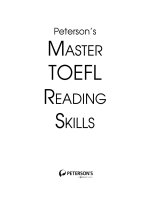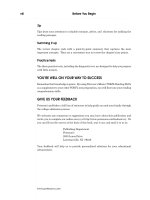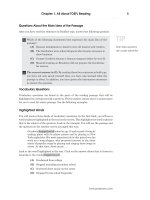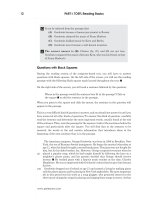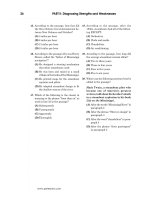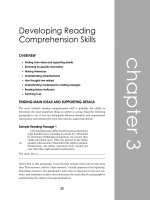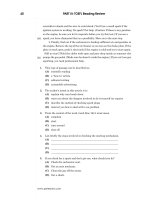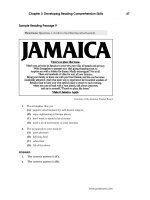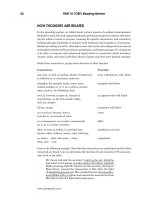Peterson’s master toefl reading skills part 21 ppsx
Bạn đang xem bản rút gọn của tài liệu. Xem và tải ngay bản đầy đủ của tài liệu tại đây (70.23 KB, 7 trang )
Practice Test 3 131
practice test 3
www.petersons.com
45. Where could the following sentence best
be added to the passage?
The speed of the river’s current is
just as extreme.
(A) After the word “Iowa” in the first
paragraph
(B) After the word “Mississippi” in the
second paragraph
(C) After the word “upstream” in the third
paragraph
(D) At the end of the fourth paragraph
46. Who discovered the mouth of the Mis-
souri River?
(A) Meriwether Lewis and William Clark
(B) French fur traders
(C) Jacques Marquette and Louis Joliet
(D) American fur traders
47. When were steamers first used on the
Missouri River?
(A) 1673
(B) 1700
(C) 1804
(D) 1830
48. Which word does the word “power” as
used in line 42 refer to?
(A) Waterway
(B) Irrigation
(C) Development
(D) Electricity
49. When was a flood control program for the
Missouri River begun?
(A) 1940
(B) 1840
(C) 1740
(D) 1640
50. In the passage, all of the following topics
are briefly discussed EXCEPT:
(A) the geography of the Missouri River
(B) the history of the Missouri River
(C) tourism and recreation on the Mis-
souri River
(D) twentieth-century development of the
Missouri River
06_TOEFL Reading,Ch 4,121-134 7/29/06, 12:03131
132 PART IV: Two Practice Tests
www.petersons.com
ANSWER KEY AND EXPLANATIONS
1. B 11. C 21. B 31. B 41. D
2. D 12. D 22. A 32. A 42. B
3. C 13. D 23. D 33. D 43. D
4. B 14. B 24. A 34. B 44. C
5. D 15. A 25. A 35. C 45. B
6. A 16. C 26. B 36. D 46. C
7. A 17. C 27. C 37. A 47. D
8. B 18. C 28. C 38. C 48. D
9. A 19. C 29. A 39. A 49. A
10. C 20. C 30. D 40. A 50. C
1. The correct answer is (B). Choice (A) does
not contain the most important facts about
the career of Jonas Salk. Choice (C) contains
information that is not mentioned in the
passage. Choice (C) is incorrect; Salk was at
the University of Pittsburgh.
2. The correct answer is (D). The other an-
swer choices are incorrect definitions.
3. The correct answer is (C). The other an-
swer choices contain words and phrases from
the paragraph but are all incorrect.
4. The correct answer is (B). The sentence
reads, “Working with scientists from other
universities in a program to classify the vari-
ous strains of the polio virus, Salk corrobo-
rated other studies in identifying three sepa-
rate strains.”
5. The correct answer is (D). Choice (A) is
incorrect because Salk did not reject the stud-
ies; he used them. Choice (B) is incorrect
because the text does not mention publishing
until the third paragraph. Choice (C) is incor-
rect because examined is not close in meaning
to corroborate.
6. The correct answer is (A). It is NOT true.
All other answers are found in the second
paragraph.
7. The correct answer is (A). Findings means
the “information gained from research and
experimentation.” The correct answer is “the
results of both tests.”
8. The correct answer is (B). In the third
paragraph, the text reports that the vaccine
was injected by needle.
9. The correct answer is (A). This informa-
tion is found in the last paragraph of the
passage.
10. The correct answer is (C). The placement
in the third paragraph is correct.
11. The correct answer is (C). The first two
letters in choice (A) are the same as those in
choice (B), but they do not make the words
synonymous. Choice (B) uses a definition that
might remind you of the word assemble. Choice
(D) is the opposite of choice (B), but it is not
the same as resemble.
12. The correct answer is (D). The other an-
swer choices contain parts of synthesizers
and violins.
13. The correct answer is (D). The other an-
swer choices are not stated in the passage.
14. The correct answer is (B). The other an-
swer choices are not stated in the passage.
15. The correct answer is (A). The meanings
of the other answers have nothing to do with
the word coupled.
16. The correct answer is (C). It is NOT used
with a violin.
17. The correct answer is (C). The placement
in the third paragraph is correct.
18. The correct answer is (C). The word its
refers to the body of the violin in this instance.
19. The correct answer is (C). The other an-
swer choices are not stated anywhere in the
passage.
20. The correct answer is (C). All other an-
swer choices are incorrect and are misstate-
ments of parts of the passage.
06_TOEFL Reading,Ch 4,121-134 7/29/06, 12:03132
Practice Test 3 133
answers
www.petersons.com
practice test 3
21. The correct answer is (B). Choice (A) is
incorrect; fiction is not published in the Times.
Choice (C) is incorrect; the Times does not
broadcast news on TV. Choice (C) is incorrect;
see paragraph 4.
22. The correct answer is (A). See the last
sentence of the first paragraph.
23. The correct answer is (D). Choices (A) and
(B) can be used to mean restrained but not in
the context of this sentence. Choice (C) is not
related to any meaning of restrained.
24. The correct answer is (A). The other an-
swer choices are not stated in the passage.
25. The correct answer is (A).
26. The correct answer is (B). The preceding
sentence mentions how other newspapers
have “lurid” stories. The sentence, “Their
publishers ran sensational stories, not be-
cause they were true, but because they sold
newspapers,” gives further detail about the
other newspapers’ stories.
27. The correct answer is (C). All of the other
answer choices are not true.
28. The correct answer is (C). Choice (A) is
incorrect because the passage does not con-
nect the paper’s reputation to its price. Choices
(B) and (D) are incorrect, because the passage
does not connect the paper’s reputation to
Ochs’s or the other New York papers.
29. The correct answer is (A). The word pub-
lication refers to the Times.
30. The correct answer is (D). The other an-
swer choices are not stated in the passage.
31. The correct answer is (B). Choice (A) is
incorrect; the United States did not exist in the
mid-eighteenth century. Choice (C) is incorrect;
Germany is not mentioned in the passage.
Choice (D) is incorrect because Pennsylvania is
not identified as a country in the passage.
32. The correct answer is (A). This is stated in
the first paragraph.
33. The correct answer is (D). The passage
mentions that travelers heading west would
stop at the “outfitting point,” and it makes
sense that travelers would need equipment
and supplies on their journey.
34. The correct answer is (B). See the second
paragraph.
35. The correct answer is (C). Vital in this
sentence means “of high importance.” Mar-
kets are places where people can sell their
products.
36. The correct answer is (D). No one men-
tioned in the other answers moved to Pitts-
burgh in great numbers after the Civil War.
37. The correct answer is (A). The other an-
swer choices do not make sense within the
context of the paragraph.
38. The correct answer is (C). See paragraph 3.
39. The correct answer is (A). The automobile
industry is not mentioned in the passage.
40. The correct answer is (A). The sentence
makes the most sense in this part of the
passage.
41. The correct answer is (D). This is stated in
the first sentence of the passage.
42. The correct answer is (B). When the word
meandering is used to describe a river, it
usually means that the river is “winding and
turning,” so choice (B) is the correct answer.
43. The correct answer is (D). This informa-
tion can be inferred from the second para-
graph of the passage.
44. The correct answer is (C). Choice (A) is
incorrect, because the topic is a river, not a
harbor, valley, or cave. Choices (B) and (D)
are incorrect meanings for the context.
45. The correct answer is (B). This is where
the sentence best fits into the passage.
46. The correct answer is (C). See paragraph 3.
47. The correct answer is (D). See paragraph 3.
48. The correct answer is (D). Electricity can
also be thought of as “electric power.”
49. The correct answer is (A). This is men-
tioned in the last paragraph of the passage.
50. The correct answer is (C). The other an-
swer choices are all mentioned in the passage.
06_TOEFL Reading,Ch 4,121-134 7/29/06, 12:03133
06_TOEFL Reading,Ch 4,121-134 7/29/06, 12:03134
P
ART V
APPENDIXES
Appendix A A Helpful Word List
Appendix B Applying to Colleges and
Universities in the U.S.
07_TOEFLReadingAppA,135-176 7/29/06, 12:22135
07_TOEFLReadingAppA,135-176 7/29/06, 12:22136
appendix a
137
A Helpful Word List
CREATE YOUR OWN WORD LIST
Get into the habit of reading a little every day with your dictionary nearby. When
you encounter a new word in a newspaper, magazine, or book, look it up. Then
jot down the new word, its definition, and the sentence in which you encountered
it in a notebook set aside for this purpose. Review your vocabulary notebook
periodically—say, once a week. Your notebook will reflect the kinds of things you
read and the words you find most difficult. The fact that you’ve taken the time
and made the effort to write down the words and their meanings will help to fix
them in your memory. Chances are good that you’ll encounter a few words from
your vocabulary notebook on the TOEFL.
abbreviate (verb) to make briefer, to shorten. Because time was running out, the
speaker had to abbreviate his remarks. abbreviation (noun).
abrasive (adjective) irritating, grinding, rough. The manager’s rude, abrasive
way of criticizing the workers was bad for morale. abrasion (noun).
abridge (verb) to shorten, to reduce. The Bill of Rights is designed to prevent
Congress from abridging the rights of Americans. abridgment (noun).
absolve (verb) to free from guilt, to exonerate. The criminal jury absolved the
man of the murder of his ex-wife. absolution (noun).
abstain (verb) to refrain, to hold back. After his heart attack, he was warned by
the doctor to abstain from smoking, drinking, and overeating. abstinence
(noun), abstemious (adjective).
accentuate (verb) to emphasize, to stress. The overcast skies and chill winds
accentuated our gloomy mood.
acrimonious (adjective) biting, harsh, caustic. The election campaign became
acrimonious, as the candidates traded insults and accusations. acrimony (noun).
adaptable (adjective) able to be changed to be suitable for a new purpose. Some
scientists say that the mammals outlived the dinosaurs because they were more
adaptable to a changing climate. adapt (verb), adaptation (noun).
07_TOEFLReadingAppA,135-176 7/29/06, 12:22137
